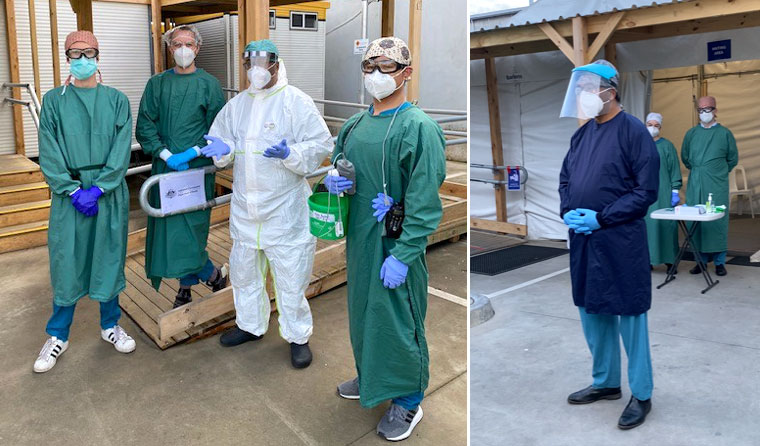News
GPs praised for their ‘great resilience and commitment’
The Government has recognised GPs’ crucial role in the COVID response – but some want a larger role in the event of another wave.
 To date, GP-led respiratory clinics have conducted more than half a million consultations, and more than 440,000 tests for COVID-19.
To date, GP-led respiratory clinics have conducted more than half a million consultations, and more than 440,000 tests for COVID-19.
‘The Government has a deep respect and gratitude for the GPs and other health professionals on the frontline of this pandemic.’
That is Mark Coulton, Federal Minister for Regional Health Regional Communications and Local Government Mark Coulton, discussing GPs working in Australia’s 146 respiratory clinics.
‘The Government acknowledges the work of all of the respiratory clinics, who have shown great resilience and commitment to supporting their local community, including building additional capacity when needed through staffing and opening hours,’ Minister Coulton said.
To date, GP-led respiratory clinics have conducted more than half a million consultations, and more than 440,000 tests for COVID-19.
These clinics cover 98.5% of the Australian population, with 82 located in regional areas and 20 running as part of Aboriginal Community Controlled Health Services.
‘This is an incredible achievement and demonstrates the commitment of the GPs and other health professionals to support the fight against COVID-19,’ Minister Coulton said.
Dr Penny Burns, Deputy Chair of the RACGP Specific Interests Disaster Management network, agrees.
Based at a respiratory clinic in Sydney’s Northern Beaches, she says the Federal Government’s $206.7 million commitment for the establishment of the GP-led clinics has been ‘absolutely crucial’ in addressing concerns over patients being unable to access their GP face-to-face.
‘It’s a great way for GPs to still be very much at the forefront of the pandemic response, and it supports GPs who may not have the ability, the capacity or the desire to see infectious patients face-to-face at this time, but who are still absolutely crucial in managing their ongoing care,’ Dr Burns told newsGP.
‘I would hate to see GPs not involved in that role because that would mean that care would get more fragmented, and during COVID is a time when we’re particularly concerned about ongoing management of chronic conditions.’
The 51 GP-led respiratory clinics in NSW last month increased their capacity by approximately 40%, and have so far assessed more than 201,600 people and conducted more than 180,900 tests for COVID-19.
In Victoria, 28 GP-led respiratory clinics have assessed more than 153,200 people and conducted more than 138,000 tests. These clinics have stepped up their capacity since the state’s second wave began, seeing up to 70% more patients per day compared to pre-outbreak assessments in early June.
Melbourne GP Dr Mukesh Haikerwal established the first respiratory clinic in Victoria in late February.
From seeing 18 patients a week, his team is now corresponding with close to 170 GP clinics about patients coming through their doors.
‘[The GP clinics have] made, in my view, a significant impact,’ Dr Haikerwal told newsGP.
‘It gave GPs an alternative to say to someone, “We’re not going to see you, we can’t see you, go to hospital”. [Instead] it meant you had a GP colleague who could see the patients fully prepared with PPE [personal protective equipment], and therefore safe, who could decant the respiratory cases in the first instance so they could be looked after, treated, tested and follow-up provided to the GP so they could do the ongoing care, all within general practice.’

All doctors and nurses at Dr Mukesh Haikerwal’s respiratory clinic are now wearing N95 respirator masks.
While Victoria recorded its lowest daily total in almost two months on Monday 24 August, with 116 new cases, Dr Mukesh says patterns from the last lockdown suggest GPs need to remain on alert for another wave once the current restrictions are eased.
While he has praise for the Federal Government’s response, Dr Haikerwal has been less impressed at a state level.
‘GPs need to be given reconnaissance from the state government about where cases are,’ Dr Mukesh said.
‘Down the road from us we had the abattoirs, we had Al-Taqwa College, we had the logistic centres all getting infected – we didn’t know a thing about it. It meant you couldn’t prepare for that.
‘DHHS [Department of Human and Human Services] has never, to this day, called us back about a single patient, either as a respiratory clinic or as a general practice.’
Dr Haikerwal says GPs need a seat at the planning table for an effective response.
‘We need to be included in that decision tree, in that treatment matrix, because we are going to do the care before, during and after the patient getting assessed,’ Dr Haikerwal said.
‘And so we should be brought into the tent, we should be included. We should be confided in that: “This is our way we’re going to do this business”.
‘We need to be supported to keep delivering because COVID is not going anywhere fast.’
Dr Burns agrees that GPs are sure to play an increasing role, both in the care of COVID-positive patients and for sequelae.
‘There’s a lot of issues around managing positive COVID patients in the home in that we need to make sure that they are monitored in case they deteriorate and they don’t access care,’ she said.
‘Also, as we’re learning, there is more evidence coming out about the longer-term sequelae of COVID, and again, I think it’s going to be general practice that steps up to the fore here and starts to manage those.’
The RACGP recently released a new resource, Guiding principles for the establishment and ongoing management of GP-led COVID-19 respiratory clinics, which includes templates for notifying patients of their results and for pathology requests.
Log in below to join the conversation.
coronavirus COVID-19 respiratory clinics
newsGP weekly poll
As a GP, do you use any resources or visit a healthcare professional to support your own mental health and wellbeing?